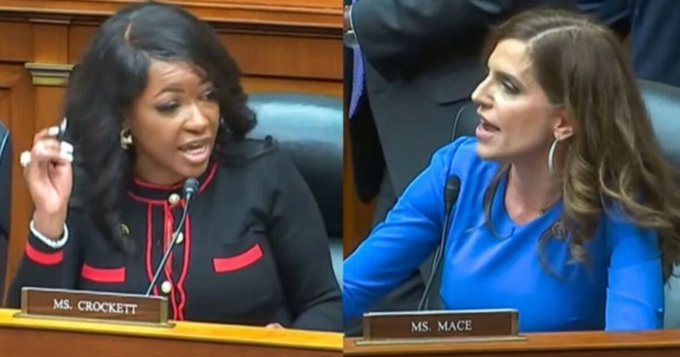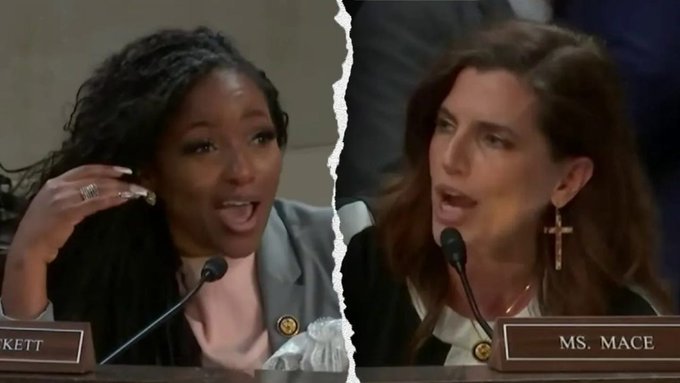Civil Rights Under Fire: The Intense Confrontation Between Rep. Mace And Rep. Crockett In Congress
- Leave a Comment
- James M
- January 15, 2025

Rep. Jasmine Crockett (D-Texas) and Rep. Nancy Mace (R-S.C.) were at odds during a recent hearing of the House Oversight Committee. The contentious exchange occurred during a conversation about transgender rights and racial rights, two topics that have emerged as hot spots in American politics.
As tensions erupted on the committee floor, the two lawmakers—who were well-known for taking strong positions on these issues—found themselves at odds not only on policy but also on a personal level.
Rep. Crockett launched the debate by criticizing Mace’s comments on transgender rights and charging her with exploiting the subject to boost her campaign.
Crockett’s comments implied that Mace was purposefully inflaming worries surrounding the subject in order to gain political advantage, and that her emphasis on transgender issues was an attempt to win over her political base. Clearly upset by the personal assault, Mace interrupted Crockett right away to protect herself.
In the heated debate that ensued, Mace defended her behavior in the face of criticism and demanded that Crockett stop referring to her as a “child.” When Mace boldly challenged Crockett, saying, “If you want to take it outside, we can do that,” the scene became more heated.
The remark was meant to take the topic out of the committee room for a more productive discussion, but some people mistook it for a threat, which sparked more uproar.
The growing divisiveness in American politics, especially on divisive topics like civil rights and transgender rights, is shown by the event with Mace and Crockett.
Although both senators remained steadfast in their stances, their disagreement brought to light the difficulties of maintaining polite conversation in a political climate that is becoming more and more polarized.

The Spark: The Discussion of Transgender and Civil Rights Issues
Rep. Jasmine Crockett and Rep. Nancy Mace got into a violent argument after Crockett accused Mace of using the topic as a political ploy and attacked Mace’s language on transgender issues. Crockett contended that Mace’s emphasis on transgender rights was a strategic ploy to strengthen her political campaign and that she was using the topic to mobilize conservative supporters.
Instead of participating in substantive policy conversations, Crockett’s critique portrayed Mace’s position on transgender rights as a means of inciting fear and hatred.
Mace seemed to take offense by Crockett’s comments, especially when she implied that Mace’s frequent reference to transgender issues was an intentional attempt to sway public opinion for political purposes.
Crockett promoted the idea that Mace’s activities were driven more by self-interest than by sincere concern for the topic by suggesting that she was attempting to stir up feelings about transgender rights for the sake of her campaign. The two lawmakers’ anxiety increased as a result of this claim, which paved the way for the subsequent personal altercation.
In reaction to Crockett’s remarks, Mace vehemently denied that her support for transsexual rights was driven by anything other than moral convictions. By interjecting, she made it apparent that she would not put up with being written off in this manner.
When Crockett called her a “child,” Mace became so enraged that she confronted Crockett right away. The argument became even more heated when Mace shot out, “I am no child, do not call me a child.” This caused a flurry of emotions in the committee room.
At the end of the conversation, Mace challenged Crockett, saying, “We can take it outside if you want to.” The remarks exacerbated an already heated situation, even though Mace subsequently clarified that she meant the remark to suggest they leave the room for a more productive conversation.
As they diverged from the main points of the discussion on transgender rights and instead centered on a more hostile interaction, this challenge highlighted the two parties’ developing personal hostility.
Rep. Nancy Mace took offense when Rep. Jasmine Crockett said "child, listen" in a response, sparking a contentious back-and-forth in which Mace challenged Crockett to "take it outside." https://t.co/hxfWQfbrU8
— FOX 4 NEWS (@FOX4) January 15, 2025
The Spark: The Discussion of Transgender and Civil Rights Issues
Rep. Jasmine Crockett and Rep. Nancy Mace got into a violent argument after Crockett accused Mace of using the topic as a political ploy and attacked Mace’s language on transgender issues. Crockett contended that Mace’s emphasis on transgender rights was a strategic ploy to strengthen her political campaign and that she was using the topic to mobilize conservative supporters.
Instead of participating in substantive policy conversations, Crockett’s critique portrayed Mace’s position on transgender rights as a means of inciting fear and hatred.
Mace seemed to take offense by Crockett’s comments, especially when she implied that Mace’s frequent reference to transgender issues was an intentional attempt to sway public opinion for political purposes.
Crockett promoted the idea that Mace’s activities were driven more by self-interest than by sincere concern for the topic by suggesting that she was attempting to stir up feelings about transgender rights for the sake of her campaign. The two lawmakers’ anxiety increased as a result of this claim, which paved the way for the subsequent personal altercation.
Mace vehemently denied that her position on transgender rights was driven by anything other than principle in reaction to Crockett’s remarks. She interrupted, stating unequivocally that she would not put up with being written off in this manner.
When Mace heard Crockett call her a “child,” her anger erupted, and she went straight to Crockett. Mace said, “I am no child, do not call me a child,” which intensified the argument and caused a flurry of emotion in the committee room.
At the end of the conversation, Mace challenged Crockett, saying, “We can take it outside if you want to.” The remarks exacerbated an already heated situation, even though Mace subsequently clarified that she meant the remark to suggest they leave the room for a more productive conversation.
As they diverged from the main points of the discussion on transgender rights and instead centered on a more hostile interaction, this challenge highlighted the two parties’ developing personal hostility.
Rep. Nancy Mace took offense when Rep. Jasmine Crockett said "child, listen" in a response, sparking a contentious back-and-forth in which Mace challenged Crockett to "take it outside." https://t.co/wCGntVgb2w
— FOX 5 NY (@fox5ny) January 15, 2025
Rep. Nancy Mace clarified her remarks on social media after the heated confrontation at the House Oversight Committee hearing. She clarified that her statement, “If you want to take it outside,” was a request for a more productive discussion away from the heated environment of the committee room rather than a threat of violence.
Mace made it clear that she wanted to escape the personal assaults that had dominated the debate and have a more fruitful conversation on the issues at hand, including civil rights and transgender problems. Assuring her fans that she had no intention of instigating violence or injury was the goal of her defense.
On the other hand, Rep. Jasmine Crockett accused Mace of threatening violence in her social media response. Crockett referred to Mace as a “attention-seeking loser” and implied that rather than participating in substantive political conversation, Mace’s actions were an effort to attract attention.
Crockett’s answer demonstrated her intense annoyance by claiming that, given the setting of a formal government hearing, Mace’s conduct were not only improper but also careless. As each legislator defended their stance against growing public scrutiny, the debate swiftly turned into a matter of dispute.
Crockett also used the occasion to draw attention to Mace’s ironic comments. Threats made in a committee room, especially during a contentious political debate, she claimed, did nothing to solve the pressing problems that Americans face today.
Crockett cited the growing cost of living, including the price of eggs, as an example and said that threats like these in Congress just serve to divert attention away from these pressing issues. Crockett argues that rather than concentrating on divisive rhetoric or personal quarrels, the emphasis should be on finding solutions to issues like inflation and economic injustice.
The fallout from Mace and Crockett’s exchange demonstrated the widening rift in Congress over issues such as transgender rights and racial rights. What started out as a policy debate swiftly turned into a personal conflict as both MPs used social media to defend their positions.
Crockett’s response highlighted the political and emotional aspects of the discussion, highlighting the fact that personal assaults in the committee room only serve to divert attention from the urgent issues that politicians should be addressing, even as Mace attempted to make her intentions clear.
For a long time, the House Oversight Committee has been a place of political theater and heated moments, when personal insults and outbursts frequently overwhelm the important problems at hand. Rep. Marjorie Taylor Greene (R-Ga.) attacked Rep. Jasmine Crockett personally during a hearing, which was one of the most prominent incidents.
“I think your fake eyelashes are messing up what you’re reading,” Greene said, making fun of Crockett’s appearance. An immediate outcry followed this slur, which highlighted the committee’s continuous battle to keep its meetings civil and professional.
In the wake of this episode, Crockett openly questioned how the committee handled personal insults, especially when they went unpunished. When members turned to personal attacks instead of having productive discussions, she was frustrated by the lack of responsibility.
Crockett’s worries stemmed from his conviction that permitting such conduct would only weaken Congress’s already shaky sense of decorum. She criticized the disparity in how personal slights are handled compared to more significant disputes.
Crockett’s criticism of the committee’s decisions brought attention to the larger difficulties the House Oversight Committee faces in upholding a civil and effective atmosphere. Partisan strife has taken over the committee, which is supposed to monitor government operations and hold public officials responsible.
There has been little opportunity for the serious conversations that are expected in a legislative body because the proceedings have often been dominated by aggressive rhetoric and personal insults. The committee’s increasing dysfunction has been exacerbated by the inconsistent application of the rules.
The House Oversight Committee’s turbulent past of insults and rudeness serves as a reminder of the larger difficulties in negotiating a sharply divided political environment. The committee’s battle to uphold decorum is still a worry as politicians like Mace and Crockett continue to disagree on matters like civil rights and transgender rights.
It is unclear if the committee will be able to resume a more focused and courteous approach to its job given the escalating tensions and the growing prevalence of personal assaults.

There are serious questions regarding the House Oversight Committee’s future effectiveness in light of the contentious confrontation between Representatives Nancy Mace and Jasmine Crockett.
The committee, which is charged with monitoring government operations and guaranteeing accountability, has grown more and more involved in partisan disputes, with personal assaults frequently taking precedence over important policy debates.
This most recent altercation only serves to emphasize the committee’s increasing dysfunction as MPs prioritize their personal complaints over solving the country’s urgent problems. The event begs the question of whether the Oversight Committee can get back on track and fulfill its duties in an efficient manner.
Not only is the gap between the parties growing, but it is also progressively contaminating the political discourse in Congress on topics like civil rights and transgender rights. Lawmakers are more inclined to disparage one another personally than to have substantive discussions on the topics that divide them, as seen by the Mace-Crockett altercation.
This division is particularly noticeable when it comes to divisive issues like transgender rights, when both sides are adamant about their positions and won’t budge. The degree of hostility on exhibit further erodes the possibility of productive discussion, making it more difficult for the Oversight Committee to carry out its mandate as an unbiased body monitoring government operations.
There is growing doubt about the House Oversight Committee’s capacity to promote fruitful discussion in the face of such strain. It becomes challenging for members to reach an agreement on complicated subjects like civil rights and transgender protections when each side is firmly committed to its own stance.
More diversions and a lack of attention to the issues at hand result from the committee’s incapacity to regulate personal attacks and uphold decorum. It will be difficult to guarantee that the committee fulfills its stated function of scrutiny and accountability if lawmakers keep putting political spectacle before substance.
A larger problem confronting Congress is the decline of productive political conversation, which is highlighted by the consequences from the Mace-Crockett exchange. It gets more difficult for legislators to have the kind of civil, meaningful discussions that are required to solve the nation’s problems when partisan divides widen and personal hostilities increase.
Like much of Congress, the House Oversight Committee must resolve these conflicts and get back to concentrating on governance and policy, or else it runs the risk of becoming even more dysfunctional and irrelevant. It is still unclear if it is still possible to have meaningful conversations in such a divisive setting.
Conclusion:
The growing political divide in Congress is highlighted by the exchange between Representatives Nancy Mace and Jasmine Crockett during the House Oversight Committee hearing.
Their confrontation’s personal aspect, which stems from divisive discussions about civil rights and transgender problems, is representative of a broader pattern in which ideological differences appear to have eclipsed the capacity for productive, policy-focused dialogue.
This altercation demonstrates the growing distance between political parties as well as the decline of decorum and deference in the legislative process.
In the future, the House Oversight Committee will have a difficult time continuing to carry out its mandate of monitoring government operations and guaranteeing accountability. It’s unclear if members will be able to resume substantive, problem-solving conversations as partisan tensions and personal assaults increasingly dominate the committee’s operations.
One crucial question is whether the committee can get back to concentrating on important policy issues rather than private disagreements. It will be challenging for the committee to carry out its vital role in a divisive setting unless civility is restored.
Additionally, the episode is a sobering reminder of the current political rhetoric in Congress. It is now more difficult for lawmakers to work together, negotiate, and find common ground on the topics that Americans care about most because of the vitriol and personal hostility that frequently characterize public debates.
The efficiency of Congress is in danger of being further undermined as long as these differences continue to exist since genuine debate seems increasingly unlikely. Restoring mutual respect and putting the needs of the country ahead of political interests are essential if productive discussions are to take place.
Congress’s political discourse is at a turning point. The conflicts between Mace and Crockett that are reflected in this debate are not unique occurrences; rather, they are a reflection of the larger issues that still impede advancement in American administration.
As the country struggles with important concerns, there is still hope that a more civil and fruitful political atmosphere may be restored, even in the face of increasing polarization.
